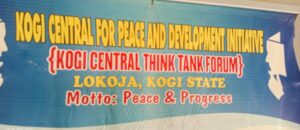

By Dada Ahmed.

In a world where rapid development hinges on partnerships, the imperative of synergy between citizen-led groups and government structures cannot be overstated. Kogi Central, one of the most vibrant senatorial districts in Kogi State, is home to the Kogi Central Think Tank Forum (KCTTF),a body of professionals, intellectuals, and community stakeholders united by a shared goal of advancing the district.However, for the forum’s vision to transform into tangible outcomes, there must be a deliberate alignment and collaboration with government policies and actions.
The KCTTF is not just another gathering of elite minds; it is a carefully organized forum of individuals who possess deep knowledge in diverse sectors including education, health, infrastructure, youth development, security, and economic planning. Its members include technocrats, scholars, policy analysts, entrepreneurs, and former public office holders, many of whom hail from or have invested interest in Kogi Central. Their ideas, if given the right platform, have the potential to redefine development in the Kogi Central and the state at large.
Despite the wealth of expertise within the KCTTF, its ideas and blueprints often float in the realm of proposals without being fully integrated into the machinery of governance. The lack of an institutional framework for the forum to liaise regularly with government stakeholders results in missed opportunities to implement people-driven development strategies inherent in its programnes.This disconnect is not uncommon in Nigeria, but it must be urgently addressed in Kogi Central to reverse underdevelopment and misaligned priorities.
For synergy to thrive, the government must recognize and institutionalize the contributions of the KCTTF. This involves more than symbolic endorsement; it calls for the inclusion of Think Tank members in planning committees, budget review teams, and project monitoring groups as it concerns the district. A functional partnership must ensure that the intellectual capital within the forum is tapped at every stage of policy formulation and implementation.
States like Lagos and Kaduna have made significant strides by engaging with policy-focused civic groups and think tanks. These collaborations have led to smarter budgeting, better health and education systems, and improved infrastructure planning. Kogi Central can replicate these models by creating formal channels of engagement between the forum and local government councils, as well as the state executive arm.
A Memorandum of Understanding (MoU) between the KCTTF and the Kogi State Government could serve as a foundational step. This agreement would outline responsibilities, expected outcomes, and operational timelines for joint initiatives. With such a framework, development projects would no longer be driven solely by political considerations but by data, evidence, and expert input from the forum.
KCTTF has already tabled several action plans, ranging from youth empowerment schemes to health outreach models, and educational reforms, security issues,tailored to local realities. These proposals remain underutilized. The government must take the lead in actualizing these ideas by allocating budgetary support and technical backing to pilot projects initiated by the forum.
Another key area of focus is financing. Many development proposals falter at the implementation stage due to lack of funds. Through Public-Private Partnerships (PPPs), KCTTF and government can jointly attract investment from development agencies, NGOs, and diaspora groups interested in transforming Kogi Central. Transparency and accountability must be central to any such financial collaboration.
For synergy to work, there must be clear, consistent communication between the forum, the government, and the people. Regular town hall meetings and digital forums can be used to report progress, gather feedback, and adapt policies based on local needs. The more people are involved, the stronger the legitimacy and sustainability of development efforts.
Kogi Central’s youth population is both a challenge and an opportunity. While unemployment and restiveness are pressing issues, the youth also represent untapped potential. The Think Tank must champion youth inclusion in governance and entrepreneurship, while the government must support policies that fund vocational training, digital literacy, and innovation hubs.
No meaningful development can take place in an insecure environment. The KCTTF can contribute to models for community policing and conflict resolution, particularly suited to the unique socio-political dynamics of Kogi Central. With government backing, these models can be scaled up to improve peace and stability across the senatorial district.
In this digital age, technology must play a central role in the synergy. The use of data dashboards, mobile reporting apps, and online platforms can help track the implementation of joint government-forum projects. This enhances transparency and provides citizens with real-time information on development efforts in their communities.
For this synergy to succeed, both parties must avoid the pitfalls of political interference. The forum must remain non-partisan, and the government must view the forum not as a political threat but as a development partner. Respect for institutional integrity on both sides will foster a culture of trust and long-term collaboration.
The time has come to move beyond talk. The government of Kogi State, through the Ministry of Planning or a special advisory unit, should formally adopt the KCTTF as a development advisory partner. Likewise, the forum must streamline its proposals into executable, costed action plans with clear metrics for success. Both sides must commit to quarterly review sessions to assess progress and recalibrate where needed.
The destiny of Kogi Central lies in the hands of its people,guided by knowledge, led by vision, and anchored in collaboration. The synergy between the Kogi Central Think Tank Forum and the government holds the promise of inclusive, sustainable, and accelerated development. But this promise can only be fulfilled when mutual respect, transparency, and shared responsibility become the guiding principles. It’s time to act,and to act together.
Ahmed is the PRO for KCTTF.

